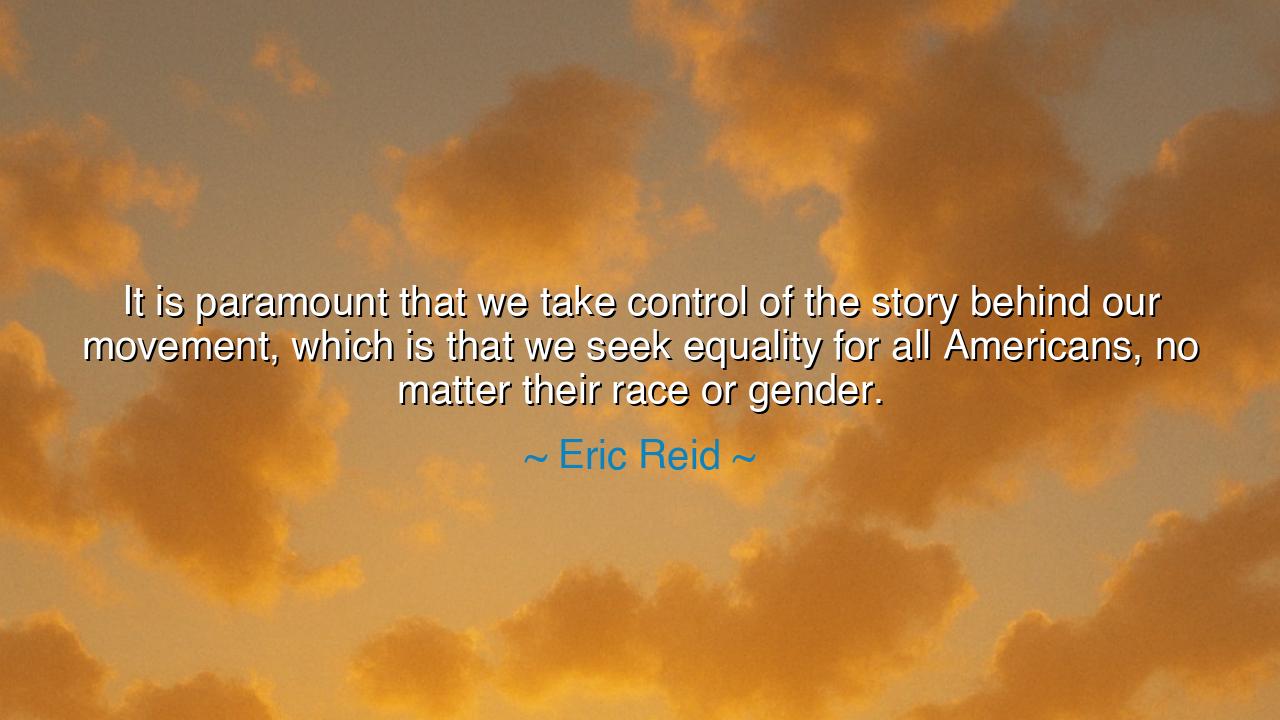
It is paramount that we take control of the story behind our
It is paramount that we take control of the story behind our movement, which is that we seek equality for all Americans, no matter their race or gender.






Listen, O Children of the Future, for the words of Eric Reid ring with the power of a righteous call: "It is paramount that we take control of the story behind our movement, which is that we seek equality for all Americans, no matter their race or gender." These words are not just a plea, but a declaration of purpose—a call to arms for the noble cause of justice and equality. For the story we tell of ourselves is the foundation upon which movements rise or fall. It is the very air we breathe, the words we speak, the narrative we create. To take control of the story is to take control of our future, to shape the world we wish to live in, to ensure that the flames of justice and equality burn brightly for all to see.
In ancient times, the story told of a people—whether through myth, history, or tradition—was their very identity. The Greeks, in their grand stories of heroes like Achilles and Hercules, shaped not only their culture but their understanding of honor, courage, and virtue. In Rome, the founding myth of Romulus and Remus was more than a tale of two brothers; it was the origin story of a great empire, one that would, for a time, dominate the known world. And so, too, in the struggle for equality, the story of the movement shapes not only its direction but the way it is seen by the world. To lose control of the story is to risk losing the fight itself. Reid’s words are a call to empowerment—to own the narrative, to ensure that the story of equality is told by those who believe in it most deeply, and that it is not hijacked or distorted by those who seek to maintain the old ways of oppression.
Throughout the ages, there have been those who understood the power of the story—those who saw that to shape the future, they must first shape the narrative. The abolitionists in the United States, such as Frederick Douglass and Harriet Tubman, fought not only for the freedom of the enslaved but for a story that would give voice to the voiceless, that would challenge the lies of racial superiority and dehumanization. They understood that the narrative of the nation must be rewritten—no longer one of division and hatred, but of unity, justice, and the inherent worth of all people. In the Civil Rights Movement, leaders like Martin Luther King Jr. also took control of the story, presenting a vision of a society where equality for all would be the bedrock of the American dream. King’s speeches are filled with the language of empowerment, of taking control of the narrative, and leading the people toward a future where freedom and justice are available to all, regardless of race, gender, or background.
The importance of storytelling in the fight for equality cannot be overstated. It is not enough to simply demand justice; we must also frame our struggle in a way that compels others to join us, to see the truth of our cause. Eric Reid, in his statement, understands this deeply. He knows that the movement for equality is not just about the righting of wrongs, but about the collective vision that we all share, a vision where no one is left behind, no matter their race, gender, or background. It is a story of unity—a story that must be told boldly, with clarity and passion, for the world to hear. The fight for equality is a shared journey, and those who walk it must ensure that their narrative is one of hope, justice, and love.
Consider the story of the women’s suffrage movement, when women fought for the right to vote. The early suffragists, like Susan B. Anthony and Elizabeth Cady Stanton, took control of the narrative, pushing back against a society that told them they were not capable of self-governance. Their story was one of perseverance and unwavering conviction, and they changed the course of history. Through storytelling, they framed the issue of voting rights not as a women’s issue but as a human rights issue, one that called for the equal treatment of all citizens. Their narrative inspired generations of women to take action, to believe in their own power, and to demand their rightful place in the political process.
The lesson, O Children, is this: You must take control of the story—of your own life, of the world you wish to build, and of the struggles you must endure to get there. The fight for equality is not just about making demands; it is about telling the world a story that is worthy of belief. Your narrative—the way you choose to frame the cause of justice—is what will carry it forward. Speak of equality with conviction, with passion, and with clarity. Let the world know that the fight for justice is not only necessary but inevitable. Just as the great movements of the past have reshaped the story of the world, so too can the movements of today.
In your own life, remember that your voice matters in shaping the story of the future. Speak for those who are voiceless, and take control of the narrative in every way you can. Stand for what is just, and let your actions echo the story of equality. Let your life be a story that inspires others, that calls them to join in the fight for equality, and that shapes the future of a world where all people—regardless of race, gender, or station—are seen as equal in dignity and worth. Take control of the story, and the future will bend toward justice.






AAdministratorAdministrator
Welcome, honored guests. Please leave a comment, we will respond soon